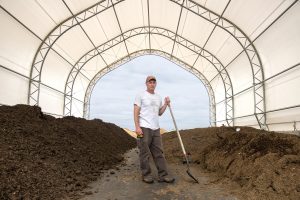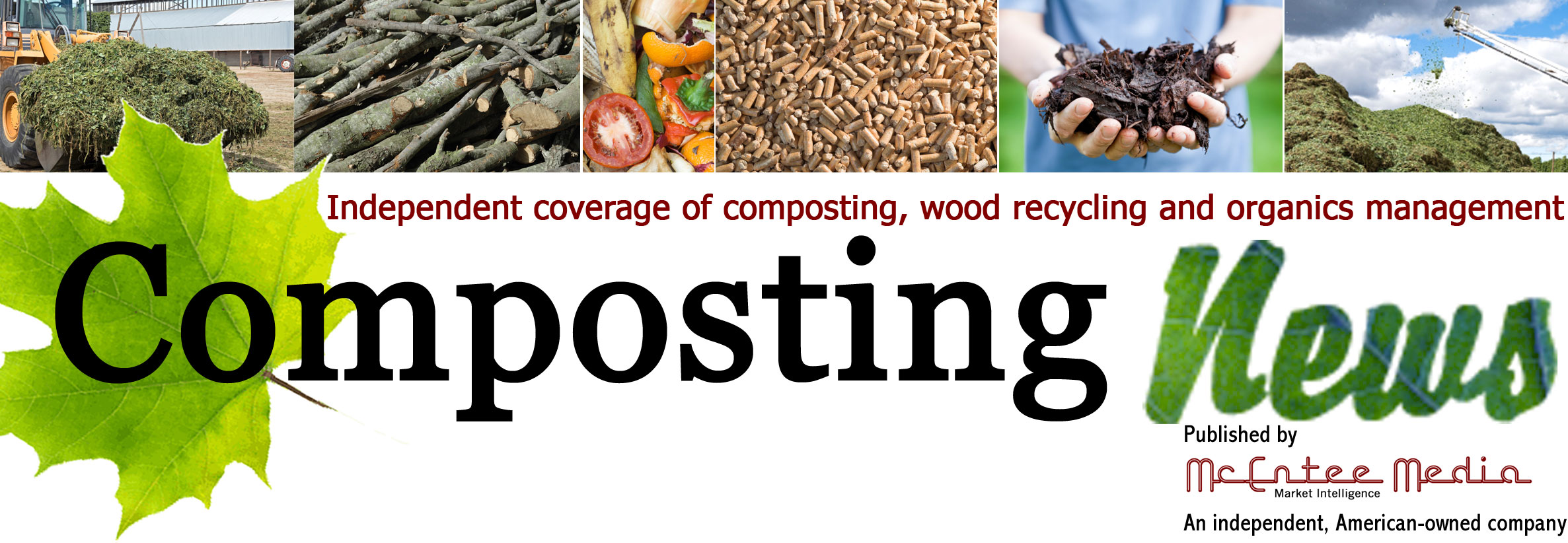By Geoff Robertson
Anyone who composts knows that if you mound up leaves, animal bedding and food scraps, you end up with a big, hot pile of compost. While most people see the nutrient-dense material as the finished product for fields and gardens, Brian Jerose also sees renewable energy and a cleaner Lake Champlain.
President and co-founder of Agrilab Technologies, Jerose is a compost consultant and innovator who pioneered energy recovery from compost, building one of the first compost aeration and heat recovery systems in the U.S. at Terry and Joanne Magnan’s farm, Diamond Hill Custom Heifers, in Enosburg Falls, Vt., in 2004.
“The French and Chinese had used methods to recover heat from compost piles,” said Jerose. “We created a negative aeration system that actively pulls vapors out of the compost and draws heat up through a hot water loop. That hot water can then used for radiant heat, wash water or to heat a barn or greenhouse.”
Compost as renewable energy
Encouraged that the Magnan farm not only cut down on energy costs, but also reduced labor and operating costs and significantly sped up the composting process, Jerose and his late business partner, Joshua Nelson, founded Agrilab Technologies.
 “Traditional methods of composting are labor intensive and therefore expensive,” said Jerose. “Someone has to drive the tractor to turn the compost, which requires fuel and maintenance, and it’s often too cold during the winter months for the pile to generate adequate heat so the whole process slows down.”
“Traditional methods of composting are labor intensive and therefore expensive,” said Jerose. “Someone has to drive the tractor to turn the compost, which requires fuel and maintenance, and it’s often too cold during the winter months for the pile to generate adequate heat so the whole process slows down.”
Jerose and Nelson believed their system could solve those problems, and return real savings to the farms in the form of renewable energy.
The newly formed company was still in start-up mode when Nelson passed away unexpectedly in 2012.
“Josh was the entrepreneur. I was the tech,” said Jerose. “It was a huge loss to the business, and to me personally.”
Jerose buckled down on building a new team, tackling research and development over the next few years and attempting to take on the sales, marketing and innovation roles Nelson had left behind.
“Farmers were our first customer,” said Jerose. “But flux in the dairy and livestock community made business planning difficult. I knew there was an opportunity, but was not sure which direction to take the company.”
Jerose, along with engineer Jason McCune-Sanders and others, focused on developing lean, efficient modular composting systems and expanded his sales pitch to municipal and big facility composting producers.
“The rural challenge is uncertainty in the marketplace, especially dairy. The urban challenge is decentralized facilities,” said Jerose. “As cities and other communities begin to talk about mandatory composting, they are going to need infrastructure and our modular systems will let them scale over time.”
Agrilab has installed units at locations ranging from the Boston urban greenhouse at the Mattapan Ecovation Center and Public Works Composting Facility to the Foster Brothers Farms/VT Natural Ag Products in Middlebury, Vt. – now one of the largest manure-based compost companies in the Northeast.
“The Fosters’ site is a shining example of return on investment,” Jerose said.
Active composting time for aerated batches has been reduced by 50 percent from four or five months down to two at the farm, with annual labor savings of $7,350 and energy savings of $17,205 per year, he said.
Composting to clean up Lake Champlain
After 15 years developing and building Agrilab’s negative aeration composting systems, Jerose identified yet another problem his technology might help to solve—phosphorus pollution.
“Part of the Lake Champlain pollution problem is runoff from fields after manure has been spread,” said Jerose. “Our equipment stabilizes materials like manure, food scraps and other biomass that contain phosphorus and makes them easier to transport and store.”
Recognizing that the phosphorus enriched compost would have value as a soil additive, Jerose began to consider a facility network in Franklin County that would not only produce compost year-round, but also assist with the reduction of phosphorus into Lake Champlain.
It was right around this time that two opportunities presented themselves.
The first was Accel-VT 2018, an accelerator program run by the Vermont Sustainable Jobs Fund to support climate economy innovation.
“Accel-VT came about at exactly the right time,” said Jerose. “For a couple of years, we had been nose to the grindstone on installations and closing sales. The program gave us time, tools and resources for examining our existing business and potential opportunities.”
With access to an impressive array of business leaders and entrepreneurs in the fields of agriculture and food technology, Jerose worked over three months to detail business strengths and weaknesses, analyze market opportunities and examine the company’s core value proposition.
“The staff, mentors and other participating entrepreneurs offered new ways to look at the value chain and solid advice on how to approach this new market,” said Jerose. “We were really able to take a hard look at business models going forward, not just focus on the technology.”
The second opportunity to present itself was the Governor’s Vermont Phosphorus Innovation Challenge. A recipient of $50,000 in Stage Two funding, Jerose is currently in the process of exploring how Agrilab’s equipment and technology can help better distribute phosphorus around the watershed – in part by making composting more efficient.
“Transporting liquid manure around in trucks poses challenges,” said Jerose. “Our process dries, stabilizes and reduces the volume of manure and other biomass, making it easier to store, transport and redistribute back to farms.”
And, because the compost aeration and heat recovery systems can capture and redirect heat back into the compost pile, the process can continue even through the coldest Vermont winters.
“At this point, we are crunching the numbers to see what makes sense, but the core idea is a network of year-round composting facilities that reduce phosphorus pollution and provide a value-added product to farms and other growers during the planting season,” Jerose said.
Through the support of Accel-VT, and motivated by a social mission to reduce phosphorus pollution, Jerose believes his business can have an environmental impact in Vermont.
“We are examining economically viable facilities that redirect pollutants, allows people to swim and enjoy Lake Champlain, helps farmers, and creates jobs in the process,” he said.
Information about the Phosphorus Innovation Challenge can be found on the Agency of Agriculture website.
Managed by the Vermont Sustainable Jobs Fund, Accel-VT is a business accelerator program that supports entrepreneurs committed to climate economy innovation. Open to startups and seed stage ventures from Vermont, the U.S., and Canada, participants are guided through the VIRAL accelerator curriculum, developed by Village Capital, designed to test assumptions, expose and remediate business vulnerabilities, prepare for significant investment, and provide a platform for rapid scale.
Robertson is the business assistance director at the Vermont Sustainable Jobs Fund.
Follow us on social media:

Be the first to comment on "Compost for a cleaner planet"